Abstract
Russia's provocative invasion of Ukraine has stirred up energy markets and geopolitics, escalating oil and gas prices to levels not seen in nearly a decade and causing several countries to rethink their energy suppliers. This crisis is a wake-up call for energy security. A bibliometric analysis of geopolitical energy security studies from 1995 to 2022 is presented in this study. The three leading journals chosen for their relevant and important publications were Energy Policy, Geopolitics and Geopolitics of Energy. These significant publications were produced individually by the two most productive authors. Interest in geopolitical energy security research has expanded to include countries as diverse as India, the Netherlands, and Kazakhstan. This focus of inquiry continues to attract new scholars from a wide range of fields. While China, Russia and the United States have a stronger connection to energy security and geopolitics, future trends should concentrate on energy policy to secure energy security. The findings of this study will be useful in determining future research topics and directions.
Keywords: Energy security, geopolitical, bibliometric analysis, content analysis, research trends
Introduction
The first oil shock in 1973 led to the emergence of the term "energy security", while the Kyoto Protocol in 1997 saw a redefinition of energy security in countries around the world. On 24 February 2022, the invasion of Ukraine by Russia roiled the markets and geopolitics of energy and the geopolitical tension will have long-lasting implications for commodities and energy policies (Sibel, 2022). The series of global events have highlighted the importance of the study of energy security to ensure the stability of energy supplies across the world.
The insecurity of energy supply leads to multiple challenges such as geopolitical and military conflicts and, of late, continued and significant fuel price rises. In their wake, they have provided opportunities for researchers to conduct in-depth studies regarding these issues. Despite the growing number of energy security studies, literature reviews and surveys in this area are scarce. Bradshaw (2009) has reviewed the geographical dimensions of energy supply and demand and the major issues that dominate global energy security. Blondeel et al. (2021) referenced the previous publication by incorporating the energy system transformation and identifying the range of geopolitical challenges associated with the transition. Despite covering various issues and providing insights into related fields, we need further insights that can be achieved by using more rigorous analysis using advanced bibliometric tools.
Bibliometric analysis can aid in the identification of existing and emerging theme areas, clusters of study and scholars, as well as opening the way for the identification of new research fields (Ali et al., 2021). Energy-related literature has been examined using bibliometric analysis (Coelho et al., 2014; Konur, 2011, 2012) and it has progressively found its way into the subject area of energy security. Kiriyama and Kajikawa (2014) used a bibliometric technique to evaluate 1157 papers on energy security published between 1948 and 2012 and conceptualized four aspects of energy security: geopolitical, economic, policy-related and technological. Zhou et al. (2018) examined the ‘clean energy’ topic using a bibliometric analysis of 2846 papers published between 2000 and 2017. However, both studies do not consider geopolitical energy security as a specific focus area.
This research intends to fill existing gaps by examining papers on the topic of geopolitical energy security from 1995 to 2022, together with reviewing global energy security literature and constructing scientific mapping to provide more insights. Quantitative evaluation adds to the current review research by including citation and content analysis tools.
The remainder of this paper is as follows: Section 2 explains the steps taken for the collection and compilation of data. Section 3 contains the methodology for conducting bibliometric analysis while Section 4 presents the findings and discussion. Lastly, Section 5 concludes the findings and makes recommendations for future research.
Data
The bibliometric analysis utilized bibliometric information from published literature to evaluate the quality of the research output and was carried out by using a statistical approach. Scopus or the Web of Science database (WoS) was the database used to retrieve bibliographic information. Ali et al. (2021) provide comparisons between three main databases and found that Scopus was superior due to its vast coverage of the interdisciplinary fields and journals. Hence, Scopus was selected as our primary data source.
The study reviewed relevant studies to identify the current state and future direction of energy research concerning the energy security and geopolitics impact across the world. The main research questions addressed in this study are as the following:
1. How is energy security research geographically distributed?
2. Which is the most productive and influential institution with respect to energy security?
3. What are the research trends being implemented across the world?
Bibliometric analysis typically entails identifying relevant keywords, analyzing the literature and doing an analysis. This study has adopted the PRISMA (Preferred Reporting Items for Systematic Reviews and Meta-Analyses) methodology which consists of a four-stage searching strategy as proposed by Moher et al. (2009). Firstly, the keywords used for literature searching were identified, followed by literature screening to determine eligibility. Lastly, the articles that were selected were included in the analysis. Figure 1 illustrates the PRISMA procedure.
Identification
The Scopus database was used to conduct the title/abstract/keywords query analysis in which the search strings were formed consisting of keywords including “energy security”, “geopolitic" and "geopolitical”. Table 1 contains the search strings. On April 20, 2022, a data search was undertaken. As a result, all papers added to the Scopus database after this date were excluded from our analysis. A total of 539 items were found during the search.
Screening
The validity of the search results was verified by two independent researchers throughout this phase of the screening stage. The initial search resulted in 539 articles which were screened to exclude duplicates and acknowledge those that met the inclusion and exclusion criteria. The criteria used to accept the papers are summarized in Table 2. The preliminary search in this study revealed that the first geopolitical energy security paper was published in 1995, so the analysis was confined to publications from 1995 to April 2022. Consequently, the number of papers linked to geopolitical energy security decreased from 539 to 302 and later decreased further to 268 after the screening in the second phase.
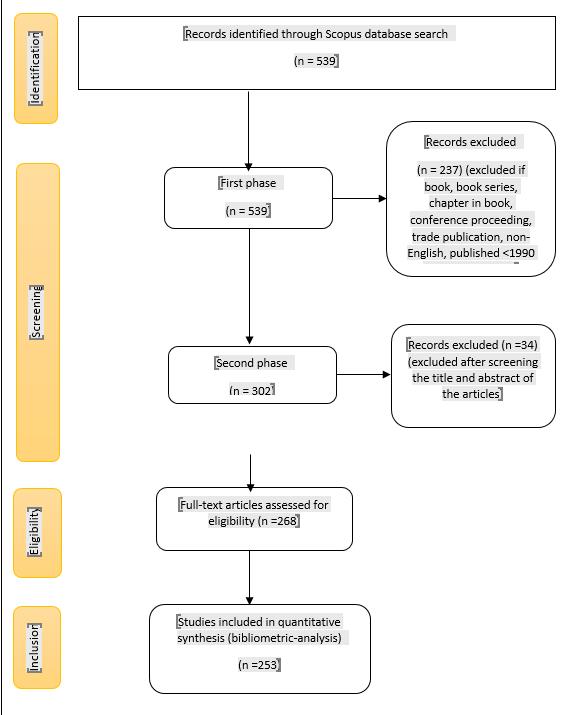
Eligibility and inclusion
Once the screening process was completed, the bibliometric information in the 268 articles was extracted and examined thoroughly to verify their relevance to the energy security field. Finally, the related articles were reviewed closely by other reviewers which led to the removal of another 15 articles, thus leaving 253 items to examine. As a result, in order to carry out bibliometric analysis, the final dataset included 253 publications containing articles accompanied by details such as author names, titles, publication years, sources, total citations, affiliations and author keywords.
Methodology
BibTex file is a file that contains 253 articles' bibliographic information imported from the Scopus database. Data cleaning was carried out on the authors' names, affiliations and keywords, a process that is important to verify the validity of the result. The data was subsequently subjected to citation and content analytics. Citation analysis is used to reveal features of the articles in terms of quantity and quality of the study, whereas content analysis seeks to discover current research hotspots through author keywords.
Various bibliometric analysis software programmes are available (R, VOSviewer, BibExcel, CiteSpace, Gephi, and Pajek). R was chosen for this analysis because R is equipped with the latest bibliometrics statistical package known as "Biblioshiny" which is designed for non-programmer users (Aria & Cuccurullo, 2017).
Results
The analysis started by analyzing the general performance of the articles by measuring the total publications and their citations according to author, affiliations, country and journal. Additionally, content analysis enabled an assessment of new research hotspots in the field of geopolitical energy security thereby permitting other academics to explore these new research themes in future research.
Annual publications
The annual literature publication frequency of geopolitical energy security is set out in Figure 2, and reveals that before 2000, the number of publications was stagnant. Starting from 2001, the trend of publication saw a continual increase between 2001 and 2007, it fluctuated during the 2008-2012 period, and grew significantly between 2013 and 2021, indicating the growth of interest of scholars in geopolitical energy security. Figure 2 depicts several significant global events over the last three decades, such as the leakage at the Davies Beas nuclear power station in the US (2002) and the accident at the Mei Bang nuclear power station in Japan (2004). The Great Recession in 2008 and the nuclear power plant accident at Japanese Fukushima Daiichi in Japan (2011) seem to have prompted an increase in publications which continued with the arrival of US shale oil on world markets between 2014 and 2016, and the lifting of the 1975 US oil export ban in 2015. The coronavirus (COVID-19) pandemic in 2020 added to the turmoil of energy markets as it boosted the inflationary pressures across the world while countries endeavored to recover economically from the pandemic. The current Ukraine and Russia crisis (2022) has caused havoc in the global energy market due to the energy power held by Russia, the second-largest producer of natural gas and the third-largest producer of crude oil. This situation has the potential for serious energy supply disruption. Hence, it is expected that many geopolitical energy security studies will be published, debating the current issue and stimulating new research interest by focusing on energy security policy. For twenty-eight years, energy security was been an important research focus and is now very much part of the energy market.
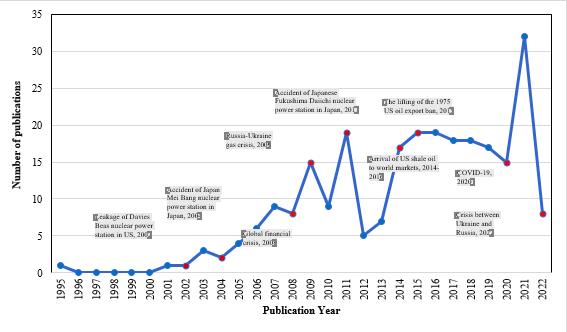
Authors’ productivity and impacts
The quantity and quality of articles were measured by using the number of publications and citations as proxies. Simultaneously, it was necessary to see if there were any links between the publication output and citations.
Leading authors in the field of geopolitical energy security between 1995-2022 are listed in Table 3. The results show that F. Proedrou and R. Pradhan were the most prolific, authoring 6.00 articles, followed by G. Bahgat with 5.00 articles. In relation to the authors' impact between 1995-2022, A. Goldthau was the top-ranked influential author with 224.00 citations, while M. Bilgin ranked second, with 181.00 citations. However, Goldthau and Bilgin placed third in terms of publication output. Therefore, the association between publication output and author impact is limited. Despite being the single author in all publications, M. Bilgin was able to produce impactful studies on geopolitical energy security.
Most productive and influential institutions
Table 4 and Figure 3 show specific institutions’ productivity and their impact based on the number of publications and citations used as indicators.
During the 1995-2022 period, the Fakir Mohan University, the Jawaharlal Nehru University and the University of Amsterdam ranked first in terms of publication output with 6.00 articles. Figure 4 shows that of the six leading institutions, three are located in India which indicates their active involvement in geopolitical energy security. This result is consistent with the approval of the Eleventh Plan by the National Development Council (NDC) on 19 December 2007 which stressed the importance of energy-saving, improving energy efficiency and the development of renewable energy sources. Responding to the international oil prices and coal prices rising sharply during the period, the Council has been credited for sparking interest in geopolitical energy security research.
The highest number of citations was captured by Bahcesehir University (174.00), the National University of Singapore (109.00) and Harvard University (102.00). This shows that the quality of publications is high and relevant to the other studies. Not surprisingly, the link between the most influential institutions and the most prolific and influential authors is strong. The Bahcesehir University was associated with M. Bilgin, while the Harvard University was associated with A. Goldthau. The Fakir Mohan University was associated with R. Pradhan. Once again, the result is consistent in showing that high-impact authors lead to an increase in affiliated institutions' influence.
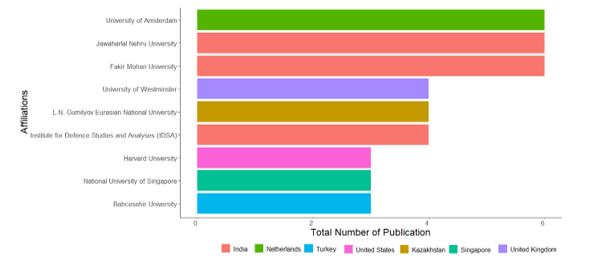
Most productive and influential countries
Table 5 and Figure 4 show the productivity of countries and their impact in the field of geopolitical energy security. Between 1995 and 2022, the UK, with 57.00 publications, dominated production in this field. This has a connection with the sequence of events that affect the security of the energy supply of European Union countries specifically. The related publications also recorded an impressive 489.00 citations, indicating that the research had an impact on geopolitical energy security. The USA is in second place, with 46.00 articles and 363.00 citations. The results show that the countries active and influential in geopolitical energy security studies between 1995 and 2022 were mostly developed countries. This indicates that developed countries have a keen interest in the stability of energy security as most of them are the most powerful countries.
That study backs up this current study’s previous findings which show a link between leading authors and their impact, and the most productive countries from 1995 to 2022. The productive authors with the most impact mostly lived in the productive countries listed in Table 5. Furthermore, other researchers from upper-middle and lower-middle-income countries, such as China and India, also actively published high-quality papers. This shows the relevance of geopolitical energy security studies, as well as the various stages of energy security development in various regions/countries. Energy exporter countries confront relatively different difficulties from energy importer countries in ensuring energy supply and demand stability, leading to shifting research interests by researchers in those countries.
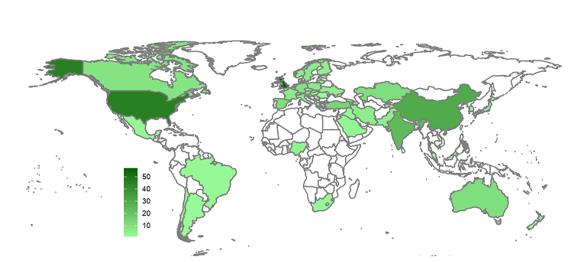
Top cited publications
The impact of articles, authors, as well as journals, is represented by the number of citations. Table 6 shows the most cited articles from 1995 to 2022 divided into "local citations" and "global citations". The frequency of being cited by others within 253 articles refers to the former. On the other hand, being cited by others across the field refers to the latter. Between 1995 and 2022, Chester (2010) and Correlje and Van der Linde (2006), for example, have the highest global and local citation numbers. The gap in the citations can show the influence of the article on geopolitical energy security studies in particular and can also indicate that the article has been widely used by scholars in other fields.
Table 6 presents the global citation received by the article “Conceptualising energy security and making explicit its polysemic nature” by Chester (2010) from 1995 to 2012 as the highest. The notion of energy security, as well as the political, economic, and social background of the current energy regime, was examined in this article. The article was published by Energy Policy and has 291 citations. Among the articles in this study’s sample, this has the second-highest number of "local citations" (10). As a result, it is thought to have a significant impact on geopolitical energy research.
The second most “globally” cited article, “Energy supply security and geopolitics: A European perspective”, by Correlje and Van der Linde (2006), was published by Energy Policy and cited 204 times in Scopus. The study seeks to discuss the effectiveness of the policy instruments because the energy policy must become an integral part of EU external trade and foreign relations and security policy. Given the dynamics of international political and economic relations, a static singular approach to energy security may not suffice (Correlje & Van der Linde, 2006). This study has the highest “local” citations at 14 and can be considered the most influential article in the field of geopolitical energy security.
Despite their considerable overall influence, Mohsin et al. (2018), Kjärstad and Johnsson (2009), and Hultman et al. (2011) have had limited impact in the field of geopolitical energy security, with two, one, and zero "local" citations, respectively. Mohsin et al. (2018) developed a composite index to assess the oil supply risk in South Asian countries. It was published in Energy and has had a modest impact on geopolitical energy security studies. Kjärstad and Johnsson (2009) evaluated worldwide oil resources, as well as the future global oil supply/demand balance on three levels: country, corporation and field. The lack of attention the article has received in the realm of geopolitical energy security is puzzling. While Hultman et al. (2011) focused primarily on the electricity generation sector, they compared the GHG footprints of conventional natural gas, unconventional natural gas (i.e., shale gas produced through the technique of hydraulic fracturing, or 'fracking,') and coal.
It should also be mentioned that the articles in Table 6 were largely published in Energy Policy journals. This demonstrates that researchers prefer to publish their findings in a Q1 journal with an h-index of 234. It is also worth noting that practically all of the most cited publications from 1995 to 2012 were published in "established" energy journals.
Most influential journals
According to this study, articles on geopolitical energy security have been published across 132 journals, demonstrating the diversity of publications and broad concerns about this topic. Table 7 shows the most influential journals from 1955 to 2022.
During the 1995-2022 period, the Energy Policy, Geopolitics, and Geopolitics of Energy had 24, 15, and 11 publications respectively, on geopolitical energy security; the first two journals placed first and third in terms of the highest number of citations, 1500 and 205, respectively. Five high impact articles on this topic were published by Energy. The large number of citations associated with a publication can be attributable to the most influential papers it produces. The top four most-cited articles, for example, account for more than half of the citations credited to the Energy Policy during that period. Another one of the most cited articles, “Assessing oil supply security of South Asia” by Mohsin et al. (2018) in Table 6 was published in the Energy. By contrast, the 11 publications that discussed US and China’s energy security in Geopolitics of Energy in particular, were not widely cited.
The first volume of Energy Policy was published in 2003 and it quickly became the most widely read and important journal in the field of energy security. Publications retrieved from these journals provide a good starting point, provide advice for present and future researchers in the field of global energy security and will help them further their research efforts and expand their knowledge. In addition to the three leading journals, Table 7 shows that researchers had a range of choices for publishing their findings throughout this period. This type of information helps assist young scholars in selecting appropriate outlets for their research output.
Research trend
Bibliometric analysis through author keywords has also been used to characterize research interests and discover patterns. Author keywords, in particular, give a solid indicator of an article's research focus and core. As a result, this paper looks at author keywords using a keyword cloud and co-word analysis in this section.
The study was undertaken by separating the sample period into two sub-periods, 1995-2012 and 2013-2022, to explore how topical areas and publication features have developed over time in response to changes in the overall geopolitical energy security studies. Overall, author keywords were discovered in the publications published between the sub-periods. The frequency of appearance of these author keywords was used to rank them. Table 8 lists the 10 most commonly used author keywords, which are depicted in Figure 5(a) - (b). Table 8 shows that between 1995-2012, apart from “energy security” and “geopolitics”, “Russia”, “China”, “European Union” and “Caspian region” were the top author keywords that appeared in geopolitical energy security studies. This reflects the fact that the energy security issues among the energy market player are concentrated in these geographical areas. The Caspian region holds one of the world’s largest oil and gas reserves, making it very significant in global markets. To meet the growing demand for oil and natural gas, Russia, the European Union (EU) countries and China are eyeing the Caspian region to fulfill their needs. While Russia is a major exporter of oil, natural gas and coal to EU countries, they are trying to reduce their dependence on Russia’s energy due to the Russia-Ukraine gas crisis that could disrupt the energy supply. On the other hand, the transportation of oil and natural gas from the Caspian region to East Asia is possible via the Kazakhstan-China oil pipeline and the Turkmenistan-China gas pipeline (U.S. Energy Information Administration, 2013).
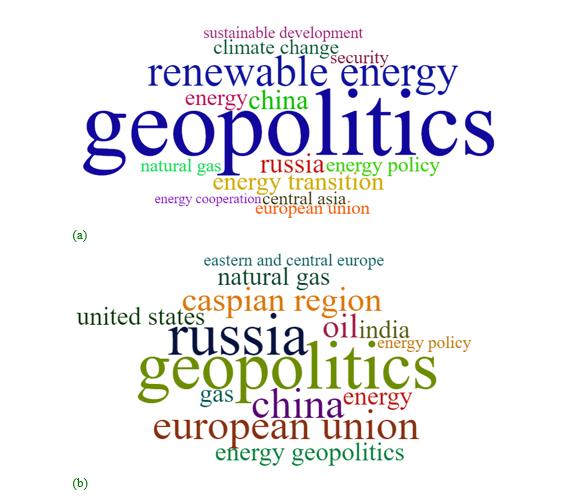
During the 2013-2022 period, other than “energy security” and “geopolitics”, “renewable energy”, “energy transition” and “climate change” emerged as new “popular” author keywords. These three keywords were interconnected as the world is moving towards Net-Zero Carbon Emissions by 2050 while strengthening energy security simultaneously (Månsson, 2015). Each country that signs the Paris Agreement is bound to mitigate carbon emissions. One of the ways to combat climate change is by replacing conventional energy sources (fossil fuels and coal) with renewable energy. Renewable energy includes solar, hydropower, wind, biomass, hydrogen and nuclear energy. By reducing the dependence on conventional fossil fuels and coals, the carbon emissions are also reduced which leads to the securitization of energy. As energy demand decreases, war or conflicts between the main energy producer countries can be avoided. However, the transition to renewable energy has an impact on geopolitical energy security. In 2020, the European Union pursued the “European Green Deal”, a comprehensive plan to fight climate change that will reduce its dependency on the energy superpower Russia, diminish the role of Russia and its interests and examine the question of energy security (Peña-Ramos et al., 2020). Moreover, the transition to renewable energy, which includes the substitution of coal for natural gas, will affect energy security negatively, as total energy production is reduced (Berdysheva & Ikonnikova, 2021). Energy security can be achieved by diversifying the fuel portfolio.
The researchers of this paper believe that “energy transition” will likely continue to be a fruitful topic to explore, as COP26 in 2021 discussed the actions to achieve the goals of the Paris Agreement. COP26 indicated that coal would still be affecting climate change in the near future as the usage will be reduced rather than phased out. However, each country would have to draw up a new energy policy and an energy transition road map to prepare for the phasing out of coal while integrating renewable energy in the future. “Energy transition” is expected to become an area of interest for further research, especially for researchers in developing countries with a high dependency on coal and fossil fuels.
Conclusion
Based on data gathered from Scopus, this study used the bibliometric method to examine the literature on geopolitical energy security from 1995 to 2022. Throughout the research period, there has been an increase in interest in the subject, as demonstrated by the increasing number of publications and proliferation of authors - 253 publications were found on the subject in 132 Scopus-indexed journals. According to this paper’s findings, Energy Policy has been the most popular vehicle for geopolitical energy security research, followed by Geopolitics. This paper’s findings also suggest that the association between publication production and the author's impact appears to be minimal. Single-author paper is more likely to be produced by active researchers.
It is unsurprising that early articles tend to focus on the UK and the US given these countries are major players in the global energy industry. As crises occur around these regions, the focus on energy security in these particular countries has been increasing. As a result, between 1995 and 2022, prominent universities such as Fakir Mohan University, Jawaharlal Nehru University, and the University of Amsterdam, have arisen where Asian researchers are heavily involved in this topic and contribute to and advance it in novel and intriguing areas. The most cited articles in geopolitical energy security studies appear to be those that discuss the context of energy security and its implications for the EU countries. The significant number of citations for these papers demonstrates that researchers from all disciplines have a strong interest in geopolitical energy security.
The number of author keywords increased from 145 in 1995 to 419 in 2013-2022, indicating a widening of challenges and continued progress in the geopolitical energy security field. In recent years, the keywords "renewable energy," "energy transition," and "climate change" have emerged in author keywords, revealing that numerous studies have attempted to study the transitions of energy from using the conventional energy sources to renewable energy sources to reduce carbon emissions. It is expected that more research into these topics will take place in the future, particularly in relation to how countries' policies and energy roadmaps can ensure a seamless energy transition.
One of the study's drawbacks is that the collection of all articles in 2022 was not complete at the time when the study was carried out. Moreover, the inclusion and exclusion criteria of the types of publications in this field and the language used might limit the discussion relating to other aspects. The researchers were also limited to using the Scopus database to find research articles. Additionally, due to restrictions, some bibliometric data might be corrupted and, to some extent, might not entirely reveal the actual purpose of the research. Bibliometric data, despite its limits, is nevertheless effective in supporting researchers in furthering their research at a higher level of quality in the future. Other analyses, such as co-citation analysis and collaboration networks are likely to be included in future publications. Moreover, using other databases such as WoS and Google Scholar, to gain a larger number of articles in bibliometric analyses might lead to more meaningful and fruitful discussions.
Acknowledgments
The authors would like to acknowledge and thank Universiti Tenaga Nasional and Innovation & Research Management Centre (iRMC) the BOLD2022 Internal research funding.
References
Ali, N. S. Y., Yu, C., & See, K. F. (2021). Four decades of airline productivity and efficiency studies: A review and bibliometric analysis. Journal of Air Transport Management, 96, 102099. DOI:
Aria, M., & Cuccurullo, C. (2017). Bibliometrix: An R-tool for comprehensive science mapping analysis. Journal of Informetrics, 11(4), 959-975. DOI:
Berdysheva, S., & Ikonnikova, S. (2021). The Energy Transition and Shifts in Fossil Fuel Use: The Study of International Energy Trade and Energy Security Dynamics. Energies, 14(17), 5396. DOI:
Bilgin, M. (2009). Geopolitics of European natural gas demand: Supplies from Russia, Caspian and the Middle East. Energy Policy, 37(11), 4482-4492. DOI:
Blondeel, M., Bradshaw, M. J., Bridge, G., & Kuzemko, C. (2021). The geopolitics of energy system transformation: A review. Geography Compass, 15(7), e12580. DOI:
Bradshaw, M. J. (2009). The geopolitics of global energy security. Geography Compass, 3(5), 1920-1937. DOI:
Chester, L. (2010). Conceptualising energy security and making explicit its polysemic nature. Energy policy, 38(2), 887-895. DOI:
Coelho, M. S., Barbosa, F. G., & Souza, M. D. R. A. Z. D. (2014). The scientometric research on macroalgal biomass as a source of biofuel feedstock. Algal Research, 6, 132-138. DOI:
Correlje, A., & Van der Linde, C. (2006). Energy supply security and geopolitics: A European perspective. Energy policy, 34(5), 532-543. DOI:
Goldthau, A., & Witte, J. M. (2009). Back to the future or forward to the past? Strengthening markets and rules for effective global energy governance. International Affairs, 85(2), 373-390. DOI:
Hultman, N., Rebois, D., Scholten, M., & Ramig, C. (2011). The greenhouse impact of unconventional gas for electricity generation. Environmental Research Letters, 6(4), 044008. DOI:
Kiriyama, E., & Kajikawa, Y. (2014). A multilayered analysis of energy security research and the energy supply process. Applied Energy, 123, 415-423. DOI:
Kjärstad, J., & Johnsson, F. (2009). Resources and future supply of oil. Energy policy, 37(2), 441-464. DOI:
Konur, O. (2011). The scientometric evaluation of the research on the algae and bio-energy. Applied energy, 88(10), 3532-3540. DOI:
Konur, O. (2012). The scientometric evaluation of the research on the production of bioenergy from biomass. Biomass and Bioenergy, 47, 504-515. DOI:
Månsson, A. (2015). A resource curse for renewables? Conflict and cooperation in the renewable energy sector. Energy research & social science, 10, 1-9. DOI:
Moher, D., Liberati, A., Tetzlaff, J., Altman, D. G., & Prisma Group. (2009). Preferred reporting items for systematic reviews and meta-analyses: the PRISMA statement. PLoS med, 6(7), e1000097. DOI:
Mohsin, M., Zhou, P., Iqbal, N., & Shah, S. A. A. (2018). Assessing oil supply security of South Asia. Energy, 155, 438-447. DOI:
Peña-Ramos, J. A., Bagus, P., & Amirov-Belova, D. (2020). The North Caucasus Region as a Blind Spot in the “European Green Deal”: Energy Supply Security and Energy Superpower Russia. Energies, 14(1), 17. DOI:
Sibel, M. (2022, February 28). Russia-Ukraine crisis to have long-lasting impacts on commodities, energy policies. Anadolu Agency. https://www.aa.com.tr/en/energy/oil/russia-ukraine-crisis-to-have-long-lasting-impacts-on-commodities-energy-policies/34728
Umbach, F. (2010). Global energy security and the implications for the EU. Energy policy, 38(3), 1229-1240. DOI: 10.1016/j.enpol.2009.01.010.
U.S. Energy Information Administration. (2013, August). Overview of oil and natural gas in the Caspian Sea region. https://www.eia.gov/international/analysis/regions-of-interest/Caspian_Sea
Zhou, W., Kou, A., Chen, J., & Ding, B. (2018). A retrospective analysis with bibliometric of energy security in 2000–2017. Energy reports, 4, 724-732. DOI:
Copyright information

This work is licensed under a Creative Commons Attribution-NonCommercial-NoDerivatives 4.0 International License.
About this article
Publication Date
18 August 2023
Article Doi
eBook ISBN
978-1-80296-963-4
Publisher
European Publisher
Volume
1
Print ISBN (optional)
-
Edition Number
1st Edition
Pages
1-1050
Subjects
Multi-disciplinary, Accounting, Finance, Economics, Business Management, Marketing, Entrepreneurship, Social Studies
Cite this article as:
Yakath Ali, N. S., Mustapa, S. I., & Mohammad, N. (2023). Bibliometric Analysis of Energy Security Research: An Analysis of Global Geopolitics Consequences. In A. H. Jaaffar, S. Buniamin, N. R. A. Rahman, N. S. Othman, N. Mohammad, S. Kasavan, N. E. A. B. Mohamad, Z. M. Saad, F. A. Ghani, & N. I. N. Redzuan (Eds.), Accelerating Transformation towards Sustainable and Resilient Business: Lessons Learned from the COVID-19 Crisis, vol 1. European Proceedings of Finance and Economics (pp. 754-768). European Publisher. https://doi.org/10.15405/epfe.23081.68

